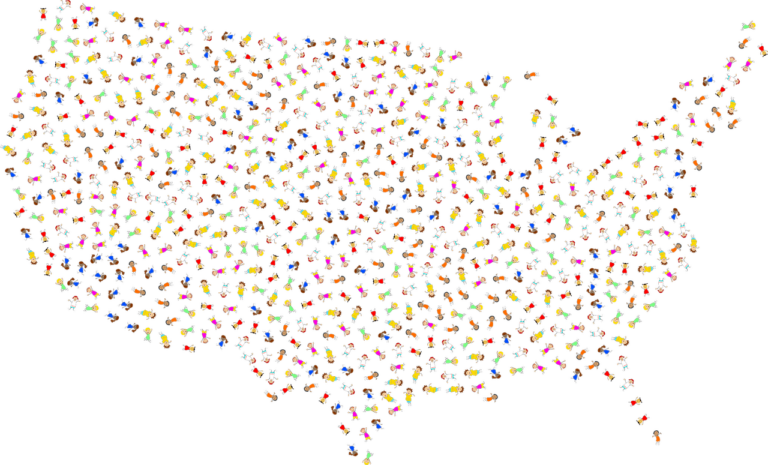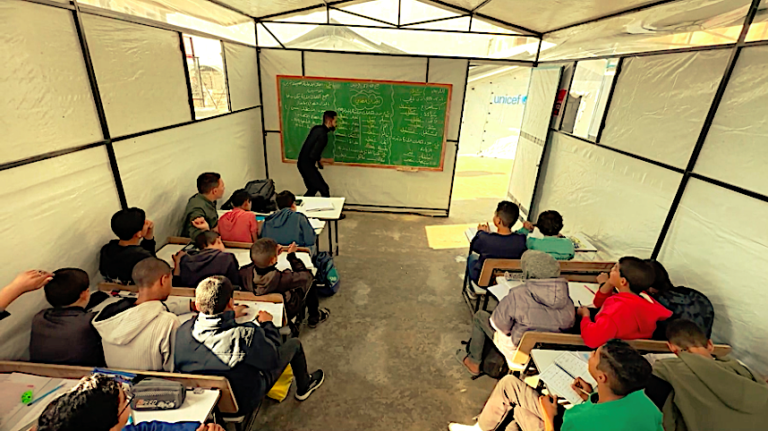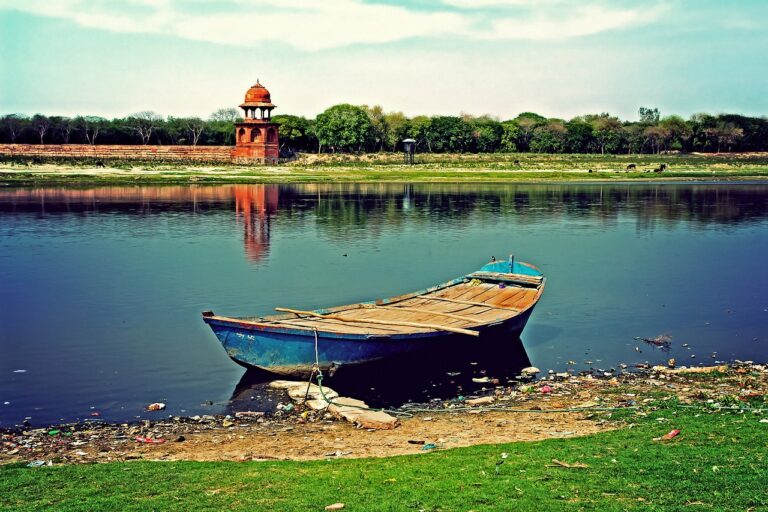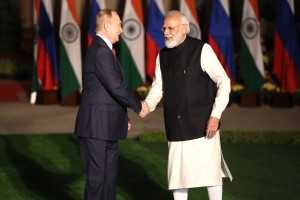
Russian President Vladimir Putin with Indian Prime Minister Narendra Modi before the Russian-Indian talks. Photo: RIA Novosti (Source : kremlin.ru)
Afghanistan is a matter of serious concern for both India and Russia
New Delhi: Russia and India today vowed to remain proactively involved on the international stage and stated terrorism and efforts to fight it were a matter of grave concern, as were combatting drug trafficking and organised crime.
Visiting Russian President Vladimir Putin had talks with Prime Minister of India Narendra Modi here today and discussed the further development of relations of “especially privileged” strategic partnership between the two countries. In this context, they said developments in Afghanistan were a matter of serious concern for both countries.
The sides discussed the evolving situation in Afghanistan, especially the security situation and its implications in the region, the current political situation, issues related to terrorism, radicalisation and drug trafficking etc. They outlined the priorities which include ensuring formation of a truly inclusive and representative government, combating terrorism and drug trafficking, providing immediate humanitarian assistance and preserving the rights of women, children and minorities.
The leaders reiterated strong support for a peaceful, secure and stable Afghanistan while emphasizing the respect for sovereignty, unity and territorial integrity and non-interference in its internal affairs. They also discussed the current humanitarian situation and decided to provide immediate humanitarian assistance to the Afghan people, and emphasised that Afghanistan’s territory should not be used for sheltering, training, planning or financing any terrorist groups including ISIS, Al Qaeda, LeT, etc.
They reaffirmed their “firm commitment” to combat terrorism in all its forms and manifestations, including its financing, the dismantling of terrorist infrastructure and countering radicalization, to ensure that Afghanistan would never become a safe haven for global terrorism. Both sides recalled the importance of the relevant UN Resolutions on Afghanistan, as well as the recent outcome documents of Moscow format consultations and other international and regional mechanisms. The leaders emphasized the central role of the United Nations in Afghanistan.
The leaders welcomed close coordination between India and Russia on Afghanistan including through the creation of a permanent consultative mechanism on the issue between the Security Councils of both countries. They highly appreciated the finalisation of the Roadmap of interaction between India and Russia on Afghanistan, which symbolized convergence of views and interests of the two sides.
The Russian side welcomed Delhi Regional Security Dialogue on Afghanistan of National Security Advisors/Secretaries of Security Council on 10 November 2021 in New Delhi and welcomed the Delhi Declaration on Afghanistan that emerged from that meeting.
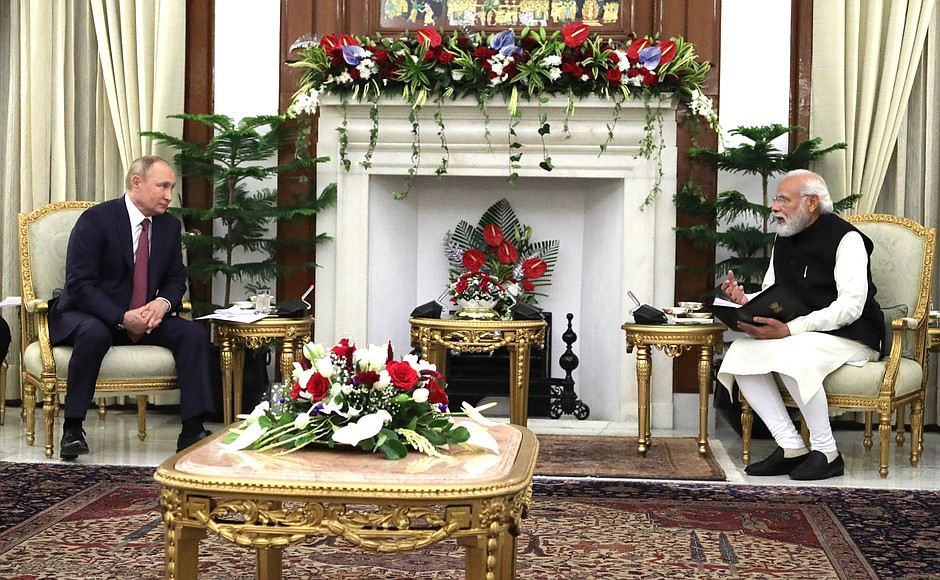
Putin and Modi exchanged opinions on the topical matters on the international agenda. Thereafter both sides also issued a joint statement, wherein, they also referred to the completion of 5 decades of the 1971 Treaty of Peace, Friendship and Cooperation and 2 decades of Declaration on Strategic Partnership, which they acknowledged as “symbolic of the long standing and time-tested India-Russia relations characterized by mutual trust, respect for each other’s core national interests and similarity of positions on various international and regional issues”.
They reaffirmed their commitment to the Special and Privileged Strategic Partnership between India and Russia, and underscored that as major powers with common responsibilities, “this important relationship continues to be an anchor of global peace and stability”.
“Russia views India as a major power, whose people have been very friendly to us. Our relations proceed from a very positive foundation. They are developing and forward-looking,” Putin remarked. He expressed satisfaction that after a 17 per cent decrease in trade between India and Russia in 2020, the first nine months of 2021 showed the trade growing by over 38 percent.
Putin said that both Russia and India have been working together in “very important and promising areas”, including energy, environment, high technology, and space.
Russia will also train an Indian cosmonaut, and the Russian President also noted that both nations were promoting military-technical cooperation “like with no other partner of ours”. He pointed out that “Together, we develop and manufacture high-technology military products, including in India”.
Both sides stressed the importance of reinvigorating multilateralism, with the central coordinating role played by the United Nations in world affairs. The sides underlined the primacy of respect for international law and emphasized their commitment to the purposes and the principles stated in the UN Charter including the principle of non-interference in the internal affairs of Member States.
Both sides also called for comprehensive reform of the United Nations Security Council to reflect contemporary global realities and to make it more representative, effective and efficient in dealing with issues of international peace and security.
Putin congratulated India on its successful Presidency of the UN Security Council in the month of August and reiterated Russia’s support for India’s permanent membership of a reformed and expanded UN Security Council.
Modi thanked Putin for his participation in the UNSC high-level debate on Maritime Security that was chaired by Modi on August 9, 2021 as part of India’s Presidency of the UNSC. He also thanked Russia for accepting to become an observer in the Non Alligned Movement (NAM), and a dialogue partner in Indian Ocean Rim Association (IORA).
The foreign and defence ministers, who were present today, held their first meeting in 2+2 format, demonstrating their commitment to developing their relations in international and military affairs. Putin and Modi welcomed the holding of back-to-back meetings of the India-Russia Inter-Governmental Commission on Military and Military-Technical Cooperation and the first 2+2 Dialogue of Foreign and Defence Ministers of India and Russia in New Delhi today. They underscored the importance of regular annual 2+2 meetings for exchanging views on global and regional political-security developments.
Indian External Affairs Minister Dr. S. Jaishankar said today at the inaugural meeting of India-Russia 2+2 Dialogue that the timing of today’s meeting was significant as it came before 21st India- Russia Annual Summit later today. The two sides discussed the emergence of multipolarity and rebalancing and also looked at the consequences of over centralized globalization. “The Covid-19 pandemic has raised questions about the current model of global affairs. But the long-standing challenges remain even as new ones emerge. Prominent among them are terrorism, violent extremism and radicalization. The situation in Afghanistan has wider repercussions, including for Central Asia. West Asia or the Middle East continues to present hotspots. Maritime security and safety is another domain of shared concern. We both have a common interest in ASEAN centrality and ASEAN-driven platforms,” Dr. Jaishankar said.
Russian Foreign Minister Sergey Lavrov said Russia and India have similar visions of the model of a more just, democratic and polycentric world order and they promote identical or very similar views on the most vital issues of peace and security.
-global bihari bureau



